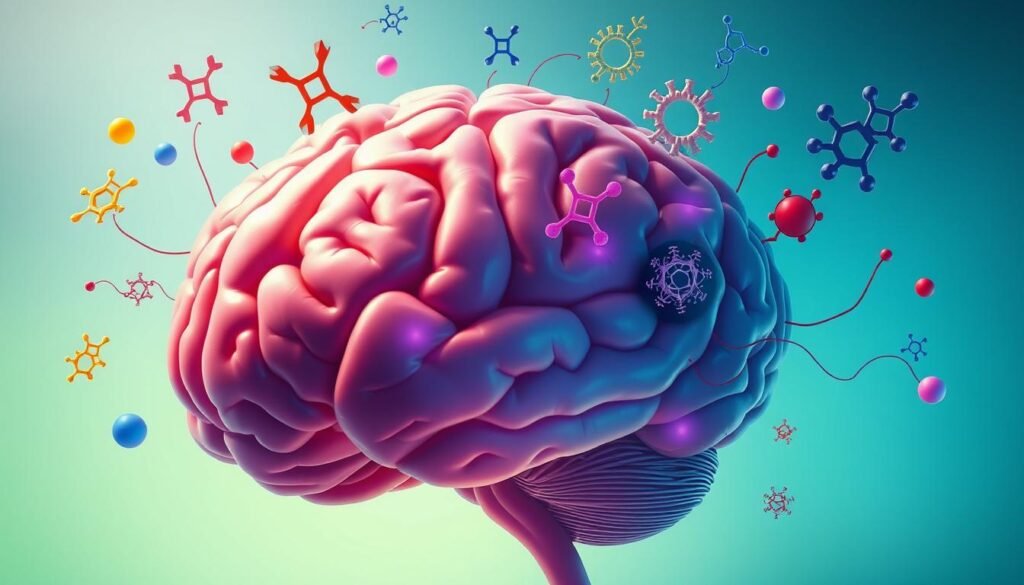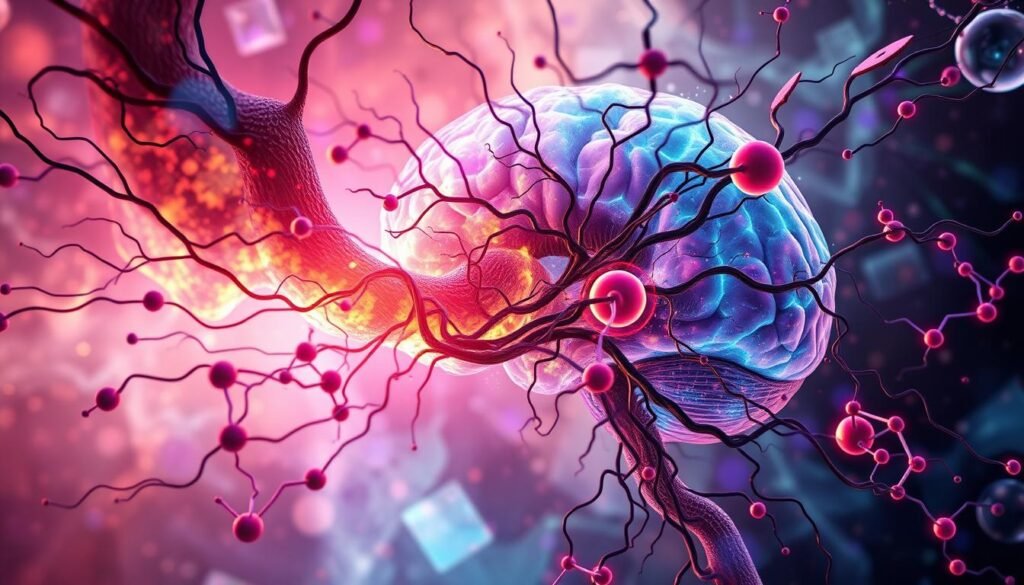Up to 80% of people assigned female at birth (AFAB) often feel physical or mood changes during their cycle. This shows hormones and anxiety are closely linked. Hormones are key in mood and emotional responses. They greatly affect how anxious someone feels. During puberty, menstruation, pregnancy, and menopause, the hormone levels change. This often results in different levels of anxiety.
This article explores how hormonal imbalances and anxiety are related. It affects both AFAB and AMAB individuals. Hormonal changes can cause anxiety in anyone. Knowing how these changes impact mental health helps in finding ways to manage it.
Key Takeaways
- Hormonal imbalances can significantly contribute to anxiety symptoms.
- People assigned female at birth are more frequently impacted by hormone-related anxiety.
- Key hormones like estrogen, testosterone, and cortisol play critical roles in mood regulation.
- Regular exercise, a balanced diet, and good sleep hygiene can help mitigate anxiety stemming from hormonal changes.
- Understanding the signs of hormonal imbalance is essential for effective anxiety management.
Introduction to Hormones and Anxiety
Understanding how hormones and anxiety are linked is key to mental health. Hormone changes can greatly impact anxiety symptoms. This is often missed by many. For example, about 80% of people assigned female at birth feel different physically and emotionally during a part of their menstrual cycle. This affects their well-being.
Hormonal imbalance isn’t just a women’s issue. Studies show testosterone affects anxiety and depression in all genders. Also, research involving 76 anxiety patients showed a link between thyroid issues and higher anxiety. This shows mental health is influenced by various hormones.
Stress hormones like cortisol and adrenaline play a big role in anxiety. When they’re high, they can cause ongoing anxiety. Also, a study found a connection between body weight, anxiety, and hormones in women. This shows how many factors come together to impact emotional health.
It’s important to note that hormone-related anxiety affects genders differently. Women often feel it more. By understanding these differences, we can better manage anxiety due to hormonal changes. This holistic view helps us consider all factors that contribute to mental health.
The Role of Hormones in Regulating Mood
Hormones and emotions are closely linked, affecting how we feel. The endocrine system plays a key role here, with many hormones interacting with the brain. Neurotransmitters like serotonin and dopamine are vital for our emotions. For example, low serotonin can lead to anxiety and mood problems.
Stress hormones like cortisol kickstart the “fight or flight” response. This affects our heart rate and breathing when we’re stressed. It can make us feel more anxious. Thyroid hormones are also important. If they’re off-balance, we might feel anxious or depressed. These hormones work together, impacting our mental health in complex ways.
For women, hormonal changes can really shake things up. The menstrual cycle causes shifts in estrogen and progesterone, leading to mood changes. And during menopause, dropping hormone levels can cause anxiety and depression. By understanding these patterns, we can spot how hormones influence our moods.
The endocrine system’s job is to keep our hormones in balance, which is key for our mental health. When our hormonal levels change, it can set the stage for mood disorders. Knowing how this happens is crucial for anyone wanting to feel better. By watching these changes and making healthy choices, we can handle these mood shifts better.
Can Hormones Cause Anxiety?
Hormones play a big role in our mental health and can affect how we feel. Changes in hormones can make anxiety worse during big life events. These include puberty, menstruation, pregnancy, and menopause. Many people don’t realize that their anxiety could be linked to their hormone levels. Studies show that one in three women will feel anxious because of hormone changes at some point in their lives.
Understanding Hormonal Imbalance and Anxiety
Hormones are important for sending messages throughout our bodies. These messages help control everything from our energy levels to our moods. When these hormone levels are off, it can lead to anxiety. Research has found that changes in hormones like estrogen and progesterone can affect our moods. They can make us feel more anxious. About 80% of women feel anxious due to hormones during their menstrual cycle. Conditions like PMS and postpartum depression show how hormones can lead to anxiety.
How Hormones Act as Chemical Messengers
Hormones are key to keeping our minds healthy. If there’s a problem with these hormone signals, it can cause anxiety. This is because it messes with the balance of chemicals that affect our mood. Stress hormones like cortisol and adrenaline can make us feel anxious even when there’s no danger. Also, low testosterone levels can increase anxiety in all genders. Understanding how hormones affect our mental health helps us see why they trigger anxiety.
| Hormone | Function | Impact on Anxiety |
|---|---|---|
| Estrogen | Regulates mood and serotonin levels | Fluctuations can lead to increased anxiety |
| Progesterone | Influences mood stability | Imbalance may heighten anxiety symptoms |
| Testosterone | Energy and mood regulation | Low levels linked to higher anxiety |
| Cortisol | Stress response | Excessive levels can trigger anxiety |
| Oxytocin | Promotes bonding and reduces stress | Higher levels may alleviate anxiety |
Identifying Hormones That Impact Anxiety Levels
Understanding hormones that impact anxiety is key for emotional health. Each hormone affects our mood in different ways. Knowing about estrogen, progesterone, and testosterone can help us understand our feelings. It also helps us find ways to manage our emotions.
Estrogen and Its Fluctuations
Estrogen is vital for mood balance. It changes during menstruation, pregnancy, and menopause, affecting anxiety. For example, anxiety often increases in the luteal phase of the menstrual cycle when estrogen drops. Studies show these changes can lead to mood issues. This highlights how estrogen impacts mood and its role in emotional well-being.
Progesterone: The Mood-Inducing Hormone
Progesterone is linked to anxiety during the menstrual cycle. High levels might cause anxiety or depression. This is because it affects how the brain handles fear and stress. Understanding the progesterone anxiety connection is crucial. It shows us how hormone changes can make us feel anxious or moody during important hormonal shifts.
Testosterone: The Unsung Contributor
Testosterone is often not discussed in anxiety talks, but it’s important for all genders. Lower levels of it can lead to more anxiety and panic attacks. This hormone influences how we respond to stress and social situations. So, balancing hormones can help reduce anxiety and strengthen our mental health.

Stress Hormones and Their Effects on Mental Health
Stress hormones play a big role in our mental health. They are key in managing how we feel anxiety. Cortisol is the main stress hormone. It reacts during stress, causing our bodies to have a big response.
The Role of Cortisol in Anxiety
Cortisol is closely linked to anxiety. It’s released when we face danger, readying us to deal with threats. This is good for short-term dangers. But, if cortisol levels stay high for too long, it’s bad for us. High cortisol over time can make anxiety worse. It can even lead to mental and physical health problems.
Understanding Adrenaline’s Impact on Mood
Adrenaline also affects our mood and actions when stressed. It makes your heart beat faster and sends more blood to your muscles. It also makes you more alert. But when adrenaline kicks in without a real danger, it can make us overly emotional. It can lead to ongoing anxiety and mood problems. This shows why it’s important to manage stress well.
Thyroid Hormones and Anxiety Disorders
The link between thyroid hormones and anxiety is getting more focus lately. Both too little and too much thyroid hormone can affect anxiety levels a lot. Women often face these thyroid issues. Research shows that thyroid hormones anxiety is a big concern for many. This suggests that changes in hormone levels can deeply affect our mood and emotions.

Thyroid issues like Hashimoto’s and Graves’ disease can cause thyroid levels to go up or down. People with Graves’ disease usually feel more anxious. They might feel very nervous, have a faster heartbeat, and notice mood swings. A 2020 study found that people with autoimmune diseases often have different thyroid hormone levels. This can increase their chance of feeling anxious or depressed.
If your thyroid isn’t working right, it might lower serotonin levels, which can make you feel more anxious or sad. Too much thyroid hormone can make anxiety worse. This makes it harder for people to manage their emotional health. It’s important to find the right way to treat these linked health issues. This might mean getting hormone therapy or other treatments.
It’s key to understand how thyroid problems can cause anxiety. Relaxing more, making healthy choices, and practicing mindfulness can really help. Sometimes, talking to a professional or trying cognitive behavioral therapy (CBT) is needed. This is important if thyroid issues are causing a lot of anxiety.
For more detailed info on how thyroid disorders and anxiety are connected, visit this source.
Signs of Hormonal Imbalance Leading to Anxiety
Knowing the signs of hormonal imbalance is crucial for linking symptoms of hormonal imbalance to anxiety and hormonal changes. Many hormones are vital for our health. So, when they’re unbalanced, it can lead to hormone-related symptoms affecting mood and well-being.
Common Symptoms of Hormonal Imbalance
An array of symptoms can indicate hormonal imbalances. Recognizing these signs helps understand their connection to anxiety. Common symptoms include:
- Irregular periods
- Fatigue or low energy
- Acne or adult acne
- Weight changes (gain or loss)
- Elevated cholesterol
- Libido changes
- Sleep issues
- Heavy or painful periods
- More anxiety or mood swings
These symptoms often lead to more anxiety, especially if caused by hormonal imbalances.
Recognizing Patterns in Anxiety Symptoms
Looking into patterns can show how hormones affect anxiety. Keeping a diary helps track:
- When anxiety happens in your cycle
- Life events that might affect anxiety
Identifying these patterns shines a light on anxiety and hormonal changes. This insight helps manage hormonal anxiety recognition better.
| Symptom | Description |
|---|---|
| Irregular Periods | Cycle changes in frequency and intensity. |
| Fatigue | Continual tiredness affecting everyday life. |
| Weight Fluctuations | Unexplained weight changes linked to hormones. |
| Anxiety | Worry or nervousness that gets worse with hormonal changes. |
Understanding these symptoms allows individuals to seek appropriate tests and treatments. This can greatly improve mental health.
Managing Anxiety Linked to Hormonal Changes
Handling anxiety tied to hormonal shifts needs a well-rounded approach. Adopting lifestyle changes anxiety management tactics can level out hormones and ease anxiety. Regular workouts, better diet, and stress management techniques can reduce anxiety naturally.
Practical Lifestyle Changes
Changing your lifestyle can greatly help balance hormones and lessen anxiety. Effective hormonal balance tips include:
- Regular exercise, like walking, yoga, or swimming, releases endorphins.
- Eating a diet with lots of fruits, veggies, whole grains, and lean proteins aids hormonal health.
- Using relaxation methods such as meditation or deep breathing helps in stress management.
- Getting enough sleep through a regular sleep schedule, as lack of sleep can make anxiety worse.
Making these daily changes can greatly improve emotional well-being during hormonal shifts. Those looking for alternatives can find ways to manage anxiety linked to hormonal issues.
Therapeutic Interventions and Hormonal Treatments
If lifestyle adjustments aren’t enough, various treatments can help manage anxiety clinically. Often recommended are:
- Cognitive behavioral therapy (CBT) to tackle negative thinking tied to anxiety.
- Hormone replacement therapy (HRT) for menopause-related anxiety in women.
- Bioidentical hormone replacement therapy (BHRT) helps balance hormones during shifts.
- Prescriptions for antidepressants and anti-anxiety meds from health professionals.
Knowing when to get professional help is key. As people check their symptoms and treatment responses, using both lifestyle and therapeutic methods offers a complete way to reduce anxiety naturally.

Mixing self-care and expert advice is vital for reaching a balanced emotional state with hormonal health in mind.
Expert Insights on Hormonal Impacts on Anxiety
Exploring the link between hormones and anxiety requires looking at what experts say. Health pros point out that hormones change a lot, especially in women. These changes can shake up moods and make anxiety worse. The hormone estrogen plays a big role in the brain. It can help with depression but might increase anxiety when it fluctuates a lot.
It’s key to notice signs of hormonal imbalance. People often miss symptoms like being moody, easily annoyed, or not sleeping well. These can all hint at hormone issues. Experts suggest keeping track of hormone levels and getting help if anxiety starts affecting daily life.
There are many ways to handle hormonal imbalances. Getting care that fits the individual is very important for good results. Making lifestyle changes, like eating well and exercising, helps reduce symptoms of hormone changes.
About 40% of women deal with premenstrual syndrome (PMS). Among them, 2% to 8% experience a tougher form known as premenstrual dysphoric disorder (PMDD). New moms are also at risk, with 6% to 13% facing postpartum depression. Research shows that sertraline, a kind of antidepressant, works better than a placebo.
Learning about hormonal anxiety is crucial. Those with severe anxiety should talk to health experts. They can provide ways to manage hormones and anxiety well.
| Condition | Prevalence | Treatment Insights |
|---|---|---|
| Premenstrual Syndrome (PMS) | 40% | Monitor symptoms; lifestyle changes |
| Premenstrual Dysphoric Disorder (PMDD) | 2%-8% | Consult healthcare providers; psychotherapy |
| Postpartum Depression | 6%-13% | Medication options; counseling |
Conclusion
It’s key to understand how hormones and anxiety are linked, especially with new findings on gender differences. Women face a higher risk of anxiety disorders than men. Their hormonal cycles greatly impact their emotional state. Exploring these changes throughout the menstrual cycle is critical, as shown in this hormonal anxiety summary.
About 45% of women with social anxiety notice their symptoms change with their menstrual cycle. Hormonal imbalances can not only raise anxiety levels but also increase the risk of related conditions. This highlights why knowing the causes of anxiety is crucial. It helps create better healthcare options for women.
Acknowledging hormones’ effect on mood is essential for better anxiety management. Everyone should pay attention to their body’s signs. Speaking to a healthcare provider about the hormonal impact on anxiety is a good step. This hormonal balance conclusion points out how vital a comprehensive mental health strategy is. It should tackle the complex nature of hormonal effects.